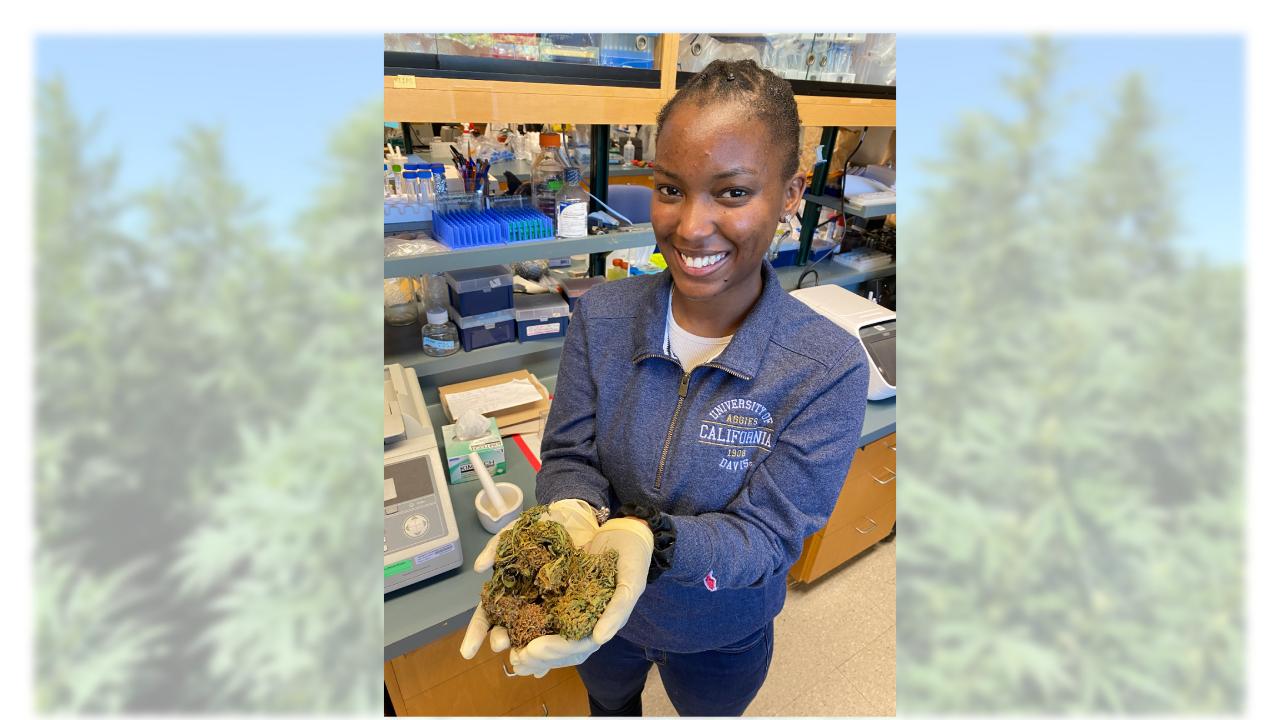
DEI scholar: Catelyn Bridges
Grant gathers her passions as scientist, mentor, advocate, mom
In 2017, Catelyn Bridges was 23, from Omaha, Neb., and starting graduate school at Texas A&M University. It was the first time in her life she saw someone like herself in a faculty position: a Black woman in the sciences.
“She really gave me the insight into what a faculty member could be on a research-teaching appointment,” Bridges recalled. “You can have a family and also do what you love and teach and mentor. That was the first insight I had that I wanted to be a professor.”
Bridges is the 2023 recipient of the UC Davis Department of Plant Sciences Graduate Student Research assistantship focusing on diversity, equity and inclusion. Sponsored by departmental funds and initiated as a special project by Chair Gail Taylor, the grant provides $20,000 yearly for four years to a graduate student whose trajectory promises to bring underrepresented people into plant sciences.

Up until now, Bridges has cobbled together funding that requires her to work several jobs. The GSR/DEI award means that, starting this fall she can dedicate 30 hours a week to her research. In the horticulture and agronomy graduate group, Bridges is collaborating with Li Tian to develop a better drying technique for medicinal cannabis. She wants to use that information to help Black and Brown hemp farmers maximize their earnings and have a greater presence in the growing industry.
For the mother of 1-year-old Nia, the grant also helps with another challenge: Child care costs $1,600 a month.
“I’m a student-parent,” Bridges said. “It’s a unique community that needs to be supported.”
A foot in the door
Support was in short supply during Bridges’ undergrad years studying biomedical engineering: Working three jobs meant she graduated with a 2.9 GPA. But when she got to graduate school for a master’s degree, that life-changing professor, Janie McClurkin Moore, understood. “She saw I had research experience and leadership experience,” Bridges said. “You have other things you’re bringing to the table besides your grades.”
That’s also when Bridges discovered the science of agriculture. She had grown up in an urban food desert, and agricultural science resonated with her ancestral roots in share-cropping: Growing food offers resilience.
Then, “I learned about a class in cannabis and hemp applications in industry. I was really interested, because of the implications of the war on drugs,” she explained. The national policy that began in 1969 to block the production, sale and use of marijuana and other substances with criminal sanctions has resulted in the disproportionate imprisonment of Black and Brown men, with harms rippling across generations. Helping farmers of color succeed in now-legal hemp cultivation is one way to help heal those decades of damage.
“I want to focus on that in future research, how Black and Brown farmers are affected in this space,” Bridges said.
Now, Bridges’ doctoral research includes building a low-cost, portable solar dryer that will speed the drying process. She plans to study its effects on color, shape, size, moisture and other factors in cannabis flowers compared to traditional shed-drying. An internship this summer at the Oak Ridge National Laboratory, in Tennessee, will equip her with electron microscopy skills to see how solar-drying affects flowers at the molecular level. With an eye toward future extension work, she plans to interview farmers and learn about their needs for post-harvest processing.
Throughout these years, Bridges also has been active in professional organizations, student support services and advocating for underrepresented students, even going door-to-door in Black neighborhoods to hand out college information. As a mentor of other student-parents at UC Davis, she sees all kinds of students and feels their struggles.
This GSR/DEI grant weaves together all those threads, while freeing her for research and funding a deeper purpose born in faith.
“I know I’m supposed to be in this space of academia and help diversify this space, now that I have the financial support,” Bridges said. “I knew I just needed a foot in the door.”
Her goal, beyond her doctorate, is to offer the example and support she yearned for as an undergrad.
“You can be the person that you always needed,” Bridges said.
About this series
This is among stories profiling people who have received a Graduate Student Research assistantship from the Department of Plant Sciences. Within the GSR grant program, the department has created a Diversity, Equity and Inclusion award. This award provides funding specifically for students who show the potential for, or have actual achievements, contributing to the department’s commitment to raise up perspectives and experiences that are under-represented in the plant sciences.
Related links
- More about Ph.D. student Catelyn Bridges.
- More about Graduate Student Research assistance, including awards supporting underrepresented students, in the UC Davis Department of Plant Sciences.
- More about the department’s efforts to bring underrepresented groups into plant sciences and into the department and create an atmosphere of diversity, equity and inclusion.
- More about GSR award recipients who have gone on to impact California and beyond.
Media Resources
- Trina Kleist, UC Davis Department of Plant Sciences, tkleist@ucdavis.edu, (530) 754-6846 or (530) 601-6846
